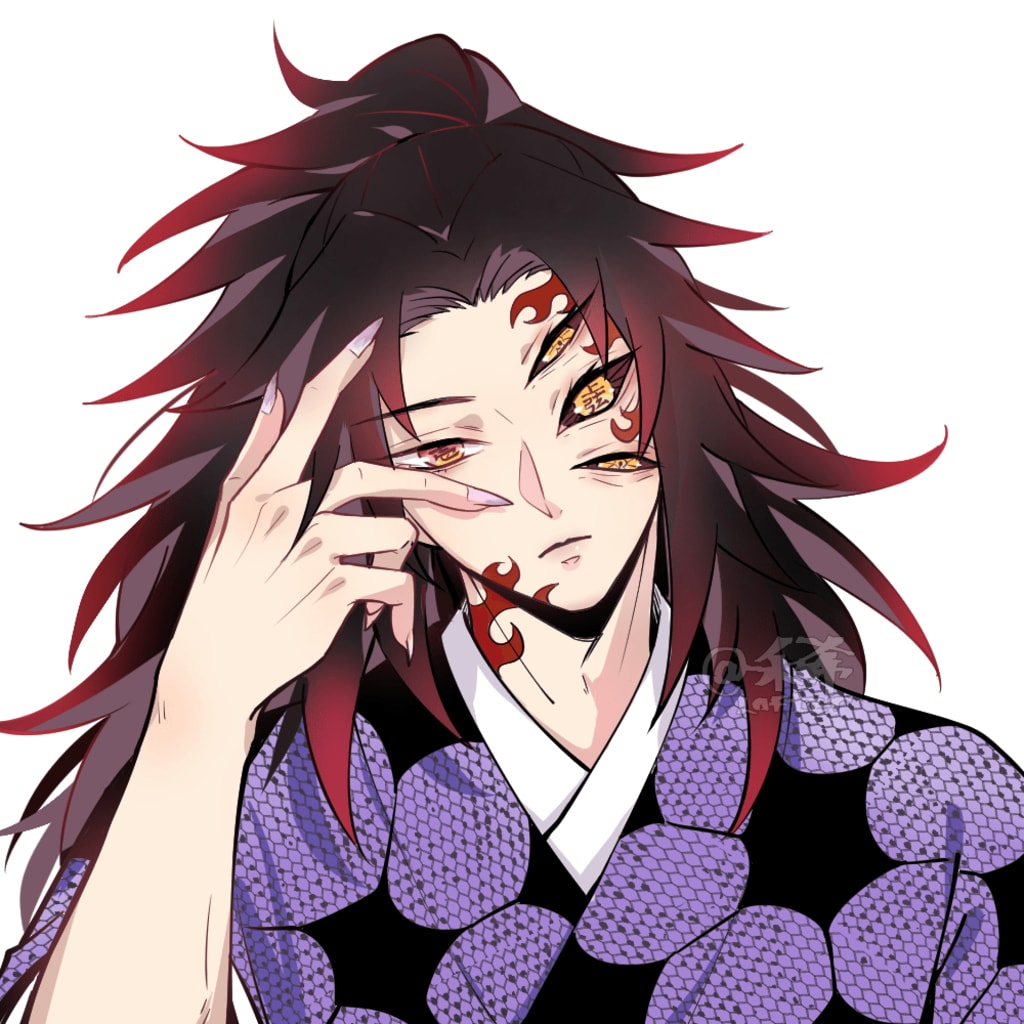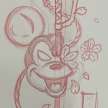Kokushibo's Descent
Unraveling the Complex Motivations Behind His Decision to Become a Demon Slayer-Turned-Demon in "Demon Slayer: Kimetsu no Yaiba"

"Demon Slayer: Kimetsu no Yaiba" has enthralled audiences with its intricate storytelling, memorable characters, and intense battles between demon slayers and demons. Among the formidable adversaries faced by the series' protagonists is Kokushibo, a former Demon Slayer who ultimately succumbs to demonic desires. In this in-depth essay, we will analyze the complex motivations behind Kokushibo's decision to become a demon, exploring the psychological, emotional, and existential factors that led to his transformation.
To understand Kokushibo's journey, it is essential to delve into his human origins. Originally known as Michikatsu Tsugikuni, he was a skilled and powerful swordsman, serving as the upper moon one of the Twelve Kizuki. His prowess as a Demon Slayer was unparalleled, and his abilities garnered him respect and admiration among his peers. However, beneath the surface of his formidable skills lay a deeply troubled soul, haunted by the existential questions that would ultimately pave the way for his descent into darkness. Kokushibo's journey begins with an existential crisis, a profound questioning of the meaning and purpose of his existence. As a skilled swordsman, he had attained the pinnacle of human achievement, yet the emptiness within persisted. The weight of mortality and the transient nature of human life haunted him, triggering a relentless search for a deeper, transcendent purpose that would grant his existence lasting significance. The human experience is marked by loss and grief, and Kokushibo was no exception. The series hints at a tragic event in his past, possibly the loss of loved ones or a profound personal tragedy. This loss may have served as a catalyst for his existential turmoil, pushing him to seek solace, meaning, and a way to transcend the limitations of mortal existence.
As Kokushibo grapples with his existential crisis and seeks answers to life's profound questions, he encounters the seductive allure of demonic power. The series introduces demons as beings with extraordinary abilities, eternal life, and a release from the constraints of mortality. The temptation to embrace this power becomes a compelling force, especially for someone burdened by the ephemeral nature of human life. One of the driving forces behind Kokushibo's turn to the demonic path is his fear of death and impermanence. The transitory nature of human existence, the inevitability of aging, and the impermanence of achievements became unbearable burdens for him. The promise of eternal life and power offered by demonic transformation becomes an enticing solution to his existential fears. Kokushibo, driven by a desire for unrivaled strength, is drawn to the prospect of becoming a demon. As a Demon Slayer, he had reached the pinnacle of human strength, but the limitations of mortal form remained. The demonic power, with its seemingly boundless potential, becomes an irresistible lure, promising him the strength to transcend his own humanity and achieve a level of power hitherto unimaginable.
The decision to become a demon is not taken lightly by Kokushibo. The internal struggle that unfolds within him is a profound and nuanced exploration of conflicting emotions, moral dilemmas, and the tension between his human and demonic nature. This internal conflict shapes the narrative and adds layers of complexity to Kokushibo's character. As a former Demon Slayer, Kokushibo harbors a deep sense of loyalty to the organization that once defined his purpose. The conflict arises as he grapples with the betrayal inherent in embracing the demonic path. His loyalty to the ideals of the Demon Slayer Corps clashes with the allure of demonic power, leading to a tumultuous internal struggle that plays out against the backdrop of his decision. The emotional turmoil experienced by Kokushibo is a central aspect of his character development. The series provides glimpses into his inner thoughts, regrets, and the emotional toll of forsaking his humanity. The struggle with guilt, remorse, and the consequences of his choices adds a layer of tragedy to his character, making him a compelling and multifaceted antagonist.
The role of Muzan Kibutsuji, the progenitor of demons, cannot be overlooked in Kokushibo's transformation. Muzan, a figure of immense power and cunning, serves as a catalyst for many demons' descent into darkness. The encounter between Kokushibo and Muzan likely plays a pivotal role in shaping the former Demon Slayer's decision to become a demon. Muzan, known for his ability to manipulate and deceive, may have exploited Kokushibo's vulnerabilities and desires. The promises of eternal life, unrivaled strength, and the alleviation of existential suffering could have been used as tools to sway Kokushibo toward the demonic path. Muzan's influence becomes a crucial element in understanding the external factors that contribute to Kokushibo's decision. Kokushibo's pursuit of immortality, a theme prevalent in many narratives, is deeply intertwined with his decision to become a demon. Muzan, as the embodiment of immortal demonic power, becomes the source of Kokushibo's quest for everlasting life. The tantalizing prospect of escaping the inevitability of death becomes a driving force, compelling him to make the fateful choice.
The transformation into a demon marks a profound shift in Kokushibo's identity. Once a revered Demon Slayer, he now embraces the demonic essence, shedding his humanity in pursuit of power and immortality. This transformation is not merely physical but extends to his psyche, motivations, and the very essence of his being. Kokushibo's transformation manifests not only in his physical appearance but also in the awakening of demonic abilities within him. The once-human swordsman is now a formidable adversary, wielding powers that defy the laws of nature. The series explores the implications of this transformation on his combat abilities, making him a more formidable and complex opponent for the protagonists. The loss of humanity is a central theme in Kokushibo's transformation. As a demon, he is no longer bound by human morality or ethical constraints. This moral ambiguity adds layers to his character, as he navigates the consequences of his actions without the moral compass that once guided him as a Demon Slayer.
Kokushibo's conflict with the Sun Breathing techniques, particularly those wielded by the protagonist Tanjiro Kamado, is emblematic of his internal and external struggles. The Sun Breathing, associated with purity and the power of light, stands in stark contrast to Kokushibo's demonic nature. The narrative unfolds as a battle between light and darkness, with profound implications for Kokushibo's character arc. The Sun Breathing techniques wielded by Tanjiro and other Demon Slayers carry profound symbolic weight. They represent purity, righteousness, and the unwavering pursuit of justice. The clash between the Sun Breathing and Kokushibo's demonic abilities becomes a symbolic battle between good and evil, highlighting the moral complexities of his character. Kokushibo's desperation to overcome the Sun Breathing reflects his internal conflict and the fear of being defeated by the forces of light. The series explores his evolving strategies, adaptations, and the psychological toll of facing opponents who embody the very ideals he once held as a human. This desperation adds a layer of tragedy to his character, as he grapples with the consequences of his choices.
Kokushibo's decision to become a demon in "Demon Slayer: Kimetsu no Yaiba" is a multifaceted exploration of human complexity, existential struggles, and the seductive allure of demonic power. His transformation unfolds against the backdrop of loss, grief, existential questioning, and the manipulation of Muzan Kibutsuji. The internal conflict within Kokushibo adds layers of depth to his character, as he grapples with conflicting loyalties, emotional turmoil, and the consequences of forsaking his humanity. The narrative arc of Kokushibo raises profound questions about the nature of good and evil, redemption, and the limits of the human spirit. As audiences witness his battles with the Sun Breathing techniques and confrontations with the protagonists, the ultimate fate of Kokushibo hangs in the balance. Will his story conclude in tragedy, redemption, or damnation? The series invites viewers to ponder the complexities of morality, identity, and the choices that define the destiny of its characters in a world where demons and demon slayers collide.
About the Creator
JRManglicmot
A Striving father and husband, trying to be the best I can be. I'm not perfect, but I try to be the one my family can look up to. I stumble and make mistakes from time to time, most often, but I try to learn from my mistakes.






Comments
There are no comments for this story
Be the first to respond and start the conversation.